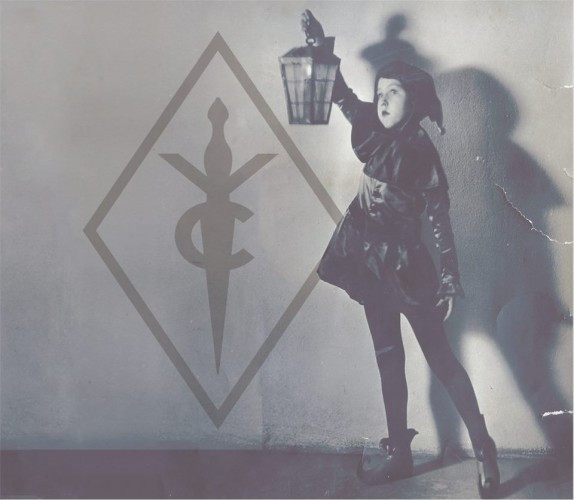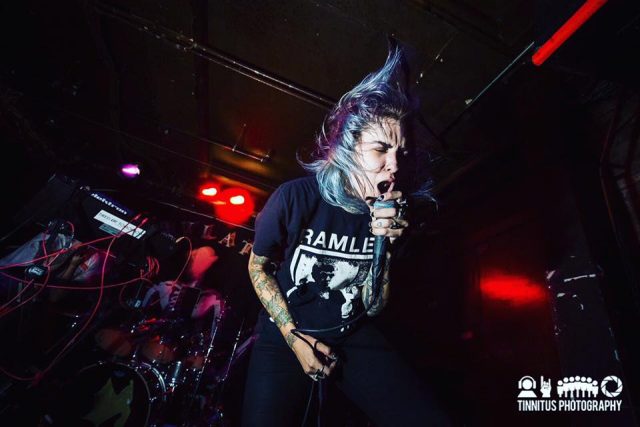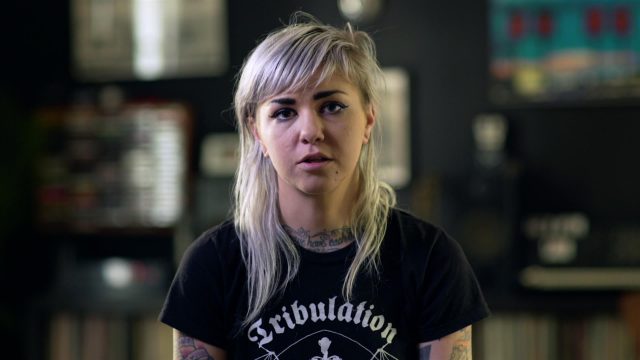(John Sleepwalker of Avopolis.gr returns to us with this interview of Youth Code’s astonishing frontwoman Sara Taylor. The band’s latest album, Commitment To Complications was reviewed on this site here.)
Youth Code is the most unconventional, yet simultaneously accessible, EBM band that would break into your house and smash your TV in pieces. By drawing their inspiration from old industrial to hardcore punk music, their blend of influences deliberately exhales remarkable amounts of intensity in ways rather provoking to all human senses. Sarah Taylor, however, was kind enough to answer our questions on the band’s not too distant past, as well as their current goals and creative focus on their music. Without denying, of course, how the internet is partialy responsible nowadays for a big loss of magic in our music.
******
Youth Code is a band name that’s easy to remember, plus it rolls off the tongue nicely. How did you come up with it and how important do you consider a good band name for a band’s promotion?
S: To be honest it was simply a joke between friends. It seemed effortless at the time, and when we first started the band it wasn’t something we had put a lot of thought into. I had quite a chip on my shoulder that all the other employees of the store I worked at were performing in this employee musician showcase, and so I volunteered Ryan [George] and myself to play that night. When asked what the band was called, I simply replied youth code, and the rest is history. I think with a band’s name you obviously should think about it to an extent — there’s a band at home that used the name “ vietcong”, which is extremely offensive and racist…. bet they wish they would’ve thought that one through before starting a career with that being the name they became most famous for.
Your latest album titled Commitment To Complications might be your most well-aimed effort to date. There is a remarkable balance traced, as if its rough landscapes are diligently covered by a greyish surface. Do you consider accessibility important to your sound? What were your thoughts in the procedure of making this record?
S: I think there have been steps with each of our releases that were subconscious but also calculated in subversive ways. With the cassette, the 7”, and the first LP, we were simply getting our creativity out to the world. We didn’t really know our capacities at all, we simply wanted to be creative together and play the music we love. Accessibility wasn’t really thought out at all in this, but as we progressed, I feel as though our capabilities increased and we knew how better to fine-tune our creativities. We are influenced by so many different facets, that accessibility would only naturally seep into what we do. I still don’t think that we go into anything intentionally directing accessibility, but with that being said it’s definitely crept its way into what we do.
Your obvious diversity seems to work great with your songwriting abilities. How important do you consider crafting pieces that can stand pretty well alone? I must say you put a lot of focus on your music, giving your best to exclude any “filler” possibility. Do you feel that every piece of music has to be important?
S: Absolutely. There is nothing poignant about releasing garbage. If you are fortunate enough to be able to release work into the world and captivate people with what you’re doing, what would be the point of releasing anything sub-par?
Your take on industrial / EBM music, among other elements, shows considerable experience, as well as depth. How much room do you think there’s left in electronic / industrial music for experimentation and what are your thoughts on Youth Code’s future?
S: There’s plenty of room for people to continuously grow with electronic music, as there is room for growth in all genres. I think with youth code as a project, we will continue to push forward for as long as this band exists and will try to further our path of going as hard as possible until we’re ok with putting this project to bed.
I guess this is a rather typical question, but what artists would you cite as the most important to the band’s identity so far?
S: Our music doesn’t really fit into any one genre so the influences are varied, anywhere from the complexities and intricacies of very extreme metal, to the obvious programming depths of old school industrial. For me personally, I didn’t really look to a particular band as influence for singing, I just yelled because it’s all I really knew to do.
Your music is surprisingly catchy, yet it shows a lot of aggression. Do you often feel anger in your lives? What do you aim at best expressing through the music you write, but also perform live?
S: Of course anger flows through everyone on a daily basis whether they choose to admit it or not. I think we aim to provide a cathartic outlet for anyone who wants to take part. The anger is obvious, but the therapeutic value in being able to release it in an unabashed sense is invaluable.
You both have quite a past in punk/hardcore music. Do you think that kind of reflects on Youth Code’s identity? Moreover, do you think that playing in a band like Youth Code encounters more difficulties compared to punk or hardcore music? It is a question whether it’s as easy to connect with the crowd, as well as what it takes to give the best kind of shows.
S: Ryan has a long-standing background in punk/ hardcore, so I think it bleeds into the band’s identity of course. I think with youth code we don’t really ever fit into one pocket because we’re too angry for a lot of the industrial crowd, and too synth for the punk crowd. We go into every show with the mindset to play as hard as possible and do our best every time. Of course it’s a lot of fun to have people sing along and dance and be active during our shows because it encourages us to go harder, but whether we play to 5 or 5000 people, we try to give it our best every time.
What were the best, as well as worst, shows you ever played at? Any specific memories you’d like to share? What should people expect from your visit in Athens?
S: My favorite shows we’ve played are the ones where people freak out and sing along… there have been quite a few at this point so it’s hard to pin-point one in particular. The worst show we’ve ever played has to be when we first started out and played a college show in middle America that was supposed to be free but they had a price on the poster. We were so new that no one knew who we were and there were only 5 people in a massive room! Instead of taking it hard we just joked for the whole set and made a fun time out of it. People coming to see us in Athens should expect a fun time and be ready to sing along!
This is a question I often ask because every answer tends to be different. Do you think the internet benefits new bands, or is mostly a disadvantage? On the one hand it’s easier to reach out to more people, but on the other, there are countless new bands nowadays. Plus, I imagine touring gets much harder for any musicians willing to promote their work.
S: The internet is weird. It gives everyone a platform and shows everything, so there is no sacred nature anymore. It’s great for accessibility, but if everything is accessible what is special anymore? What is sought after and hard to find in a realm where you can see everything? It’ll never make touring harder because the live experience should be completely separate from sitting in a room just staring at a screen. Hopefully the world doesn’t just mutate and turn into a bunch of vegetables.
Sara Taylor //
Go here to stream Commitment To Complications in its entirety and read a track-by-track commentary by Sara and Ryan.




